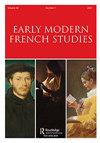Constructing a Political Crime: Songs about the Assassination of the duc and the cardinal de Guise
IF 0.2
3区 历史学
Q2 HISTORY
引用次数: 2
Abstract
Songs played a significant role in the French Wars of Religion by spreading political and religious ideas, and by involving Protestants and Catholics in the conflict. Performed in the streets, churches, workshops and houses, songs participated in the construction of urban soundscapes during the troubles. This article examines six songs composed after the execution of the duc and the cardinal de Guise on the order of Henri III (23 and 24 December, 1588) and printed in Paris by Nicolas Bonfons. This event sparked the armed revolt of the Catholic League against the king and his heir, the Protestant Henri de Navarre. The article analyses the rhetorical features of the songs and compares their arguments with those of contemporary visual images and printed libels. In particular, it shows how songs served as a link between print and oral culture. Songs allowed Leaguers — whatever their age, sex, or status — not only to assimilate the main points of the justification of the revolt and to incorporate representations of a just monarchy, but also to appropriate them intimately by singing.构建政治犯罪:关于刺杀公爵和德吉斯枢机主教的歌曲
歌曲在法国宗教战争中发挥了重要作用,传播政治和宗教思想,并将新教徒和天主教徒卷入冲突。这些歌曲在街头、教堂、作坊和民宅中演出,参与了动乱时期城市声景的建设。本文考察了六首在亨利三世(1588年12月23日和24日)下令处决吉斯公爵和红衣主教后创作的歌曲,并由尼古拉斯·邦方在巴黎印刷。这一事件引发了天主教联盟反对国王及其继承人新教徒亨利·德·纳瓦拉的武装叛乱。文章分析了这些歌曲的修辞特点,并将其与当代视觉形象和印刷诽谤的论点进行了比较。特别是,它展示了歌曲是如何成为印刷品和口头文化之间的纽带的。歌曲让同盟成员——无论他们的年龄、性别或地位——不仅吸收了起义的主要理由,并融入了一个公正的君主政体的代表,而且还通过唱歌来亲密地适应它们。
本文章由计算机程序翻译,如有差异,请以英文原文为准。
求助全文
约1分钟内获得全文
求助全文
来源期刊

Early Modern French Studies
Multiple-
CiteScore
0.10
自引率
0.00%
发文量
14
期刊介绍:
Early Modern French Studies (formerly Seventeenth-Century French Studies) publishes high-quality, peer-reviewed, original articles in English and French on a broad range of literary, cultural, methodological, and theoretical topics relating to the study of early modern France. The journal has expanded its historical scope and now covers work on the sixteenth, seventeenth, and eighteenth centuries. Within this period of French literary and cultural history, the journal particularly welcomes work that relates to the term ''early modern'', as well as work that interrogates it. It continues to publish special issues devoted to particular topics (such as the highly successful 2014 special issue on the cultural history of fans) as well as individual submissions.
 求助内容:
求助内容: 应助结果提醒方式:
应助结果提醒方式:


